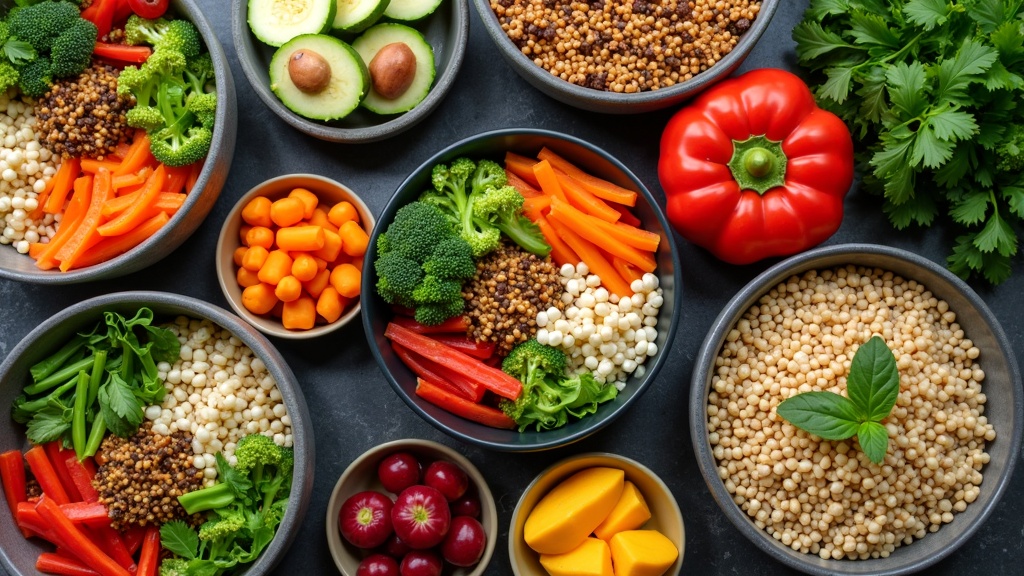Plantbased diets have sparked more conversations in recent years, especially for their links to better heart health.
From colorful salads to hearty grain bowls, it’s not only about eating less meat but about loading up on foods packed with natural fiber, antioxidants, and healthy fats.
I get a lot of questions about what the research really says, so I’m here to break down the details in a way that actually makes sense.

Why Plantbased Diets Are Getting Attention For Heart Health
A lot of talk about plantbased diets usually starts with the basics: eating more fruits, vegetables, whole grains, legumes, nuts, and seeds, while limiting or skipping animal products.
Over time, major research projects have pointed out some interesting health benefits from this way of eating, especially when it comes to the heart.
Researchers have noticed people who regularly eat mostly plantbased foods tend to have lower rates of heart disease.
Part of this effect comes from the diet’s influence on cholesterol, blood pressure, inflammation, and even body weight.
Studies published in journals like the Journal of the American Medical Association show that the more plants you eat, the better your odds of having healthy arteries.
To really understand these findings, it helps to know what scientists mean by “plantbased.”
Some people adopt a vegetarian or vegan lifestyle, while others stick to a Mediterranean or flexitarian approach, which still allows for the occasional animal product.
Most of the positive research focuses on patterns where plants are the clear focus of each meal.
This ongoing switch towards plantbased patterns is also driven by awareness of environmental impacts and the popular trend toward more mindful eating.
Whether you’re seeking to improve blood health, manage weight, or simply explore new, flavorful meals, plantbased diets make it easy to bring in a variety of nutrients and textures to every plate.
The Science Behind Plantbased Diets And Heart Health
Beneath the headlines, researchers have dug deep into how plantbased diets affect risk factors for heart disease.
Here are some main findings:
- Cholesterol Management: Replacing animal fats with plant foods can lower bad (LDL) cholesterol levels. Foods like oats, beans, and nuts have been especially helpful in clinical trials.
- Blood Pressure: People who eat more plants tend to have lower blood pressure. The potassium and magnesium found in vegetables, fruits, and legumes are a big part of that effect.
- Weight Control: Plantbased eaters often have healthier body weights, partly because plants are generally lower in calories but still filling.
- Inflammation: Research links plantbased diets to lower levels of inflammation, which is often tied to long-term heart problems.
One major study, the Portfolio Diet trial, combined several cholesterol-lowering foods, such as soy protein, viscous fiber, and nuts, and saw a notable improvement in participants’ cholesterol and heart health markers.
Other research has also shown that plantbased diets may support gut health.
A more diverse gut microbiome can help lower inflammation and may contribute to improved heart function.
This connection highlights how the foods we choose can influence our bodies in more ways than one, further stirring interest in hearthealthy eating patterns.
Getting Started With A Plantbased Diet For Heart Health
Switching to a plantbased diet doesn’t have to be all or nothing.
There are simple ways to start:
- Add More Whole Foods: Fill plates with colorful veggies, whole fruits, and unprocessed grains.
- Substitute Proteins: Swap beef or poultry for beans, lentils, tofu, or tempeh in meals you already enjoy.
- Cook At Home More: Homecooked meals let you control what’s actually in your food and how much salt, oil, or added sweetener goes in.
- Read Labels: Even plantbased products can be highly processed. Simple ingredient lists are usually better for your heart.
- Don’t Stress Perfection: Moving toward more plantbased meals, even if you’re not completely vegetarian, is still really beneficial.
In my own kitchen, I like to start each week prepping a batch of roasted vegetables, a pot of lentil soup, or an easy bean salad.
Healthy eating is easier when good options are at arm’s reach.
If you’re stuck in a rut, try new recipes from different world cuisines; dishes like Indian dal, Mediterranean hummus platters, or Latin American black bean bowls make every meal more exciting.
Things To Watch Out For When Switching Diets
Just because something is plantbased doesn’t automatically mean it’s good for your heart.
Meatless burgers, fries, and vegan snacks can still be high in salt, sugar, and unhealthy fats.
It’s helpful to keep an eye on these points:
- Sodium Overload: Canned soups, sauces, and meat alternatives can be packed with sodium, which can raise blood pressure.
- Added Sugar: Some snack bars and drinks are loaded with sweeteners, turning a “healthy” option into a sugar bomb.
- UltraProcessed Foods: Chips and desserts labeled vegan or plantbased aren’t automatically nutritious.
- Protein Balance: While most people get enough protein on plantbased diets, variety (beans, lentils, tofu, nuts, seeds, whole grains) helps cover all your bases.
Taking time to read up on nutrition facts and meal planning can make the switch much smoother, resulting in better heart health.
Planning meals ahead for the week also helps you avoid lastminute temptations or unhealthy quick fixes.
Keeping Meals Interesting and Satisfying
One of the things I like most about plantbased eating is how much flavor and variety you can get.
Roasting broccoli with garlic, tossing chickpeas in a stew, or trying out a new grain like farro can turn basic meals into something you actually look forward to eating.
Boredom or cravings can hit anyone, but experimenting with herbs, spices, and different cooking methods helps keep things tasty and satisfying.
Planning ahead makes it easier to choose hearthealthy options, even on busy days.
Understanding Nutrient Gaps
One common concern is whether plantbased diets are missing anything important.
Most nutrients, like fiber, vitamins C and E, folic acid, and magnesium, are actually easier to get when eating more plants.
But, a few things are worth watching:
- Vitamin B12: Mostly found in animal products, so folks eating fully plantbased might need to use a supplement or fortified foods.
- Iron: The iron in plant foods is less easily absorbed. Eating vitamin Crich foods alongside beans and leafy greens helps with that.
- Omega3 Fats: Flaxseeds, chia seeds, and walnuts are handy plant sources, but some people might still benefit from an algaebased supplement for heart health.
- Calcium: Leafy greens, tofu set with calcium, and fortified plant milks provide good amounts if dairy is off the table.
Regular checkins with a healthcare provider or registered dietitian can be really helpful, especially if you have existing health concerns or are making a big diet change.
Try logging your meals over a week or two to spot any patterns or gaps.
Advanced Tips For Getting The Most Heart Health Benefits
Once you’re comfortable with the basics, there are several strategies to make your plantbased diet work even harder in your favor:
Mix Up Your Proteins: The more you mix beans, lentils, nuts, seeds, and whole grains, the wider your nutrient intake.
Choose Whole Over Processed: Whole grains, like quinoa, barley, and brown rice, tend to help stabilize blood sugar and provide fiber for strong heart protection.
Add Healthy Fats: Avocado, olive oil, and nuts deliver fats that support healthy cholesterol and inflammation levels.
Just watch your portions, as these foods are calorierich.
Eat The Rainbow: Bright colors in your fruits and veggies usually mean higher levels of heartsupporting antioxidants.
For even more impact, combine different preparation methods throughout your week—try soups, grain salads, stirfries, and ovenroasted vegetables.
This helps prevent monotony and ensures a mix of nutrients in each meal.
Common Questions About Plantbased Diets And Heart Health
Here are some common questions that come up all the time:
Question: Can I lower my cholesterol without going fully vegan?
Answer: Many studies show big improvements just by eating more plants and fewer animal products.
Even small changes, like swapping red meat for beans a few days a week, can move your cholesterol in a good direction.
Question: Are there risks associated with giving up animal products?
Answer:
Most people do well, but it’s helpful to pay attention to vitamin B12, omega3 fats, iron, and calcium, as mentioned earlier.
Supplemental support might be needed depending on individual needs, but a varied, wellplanned plantbased diet usually covers most bases.
Question: Are plantbased diets okay for kids and older adults?
Answer:
Yes, but it takes a bit of extra planning. Kids, teens, and older adults may have higher needs for certain nutrients (like protein, calcium, and B12), so talking with a healthcare professional or dietitian is a good idea.
Wrapping Up: What The Research Tells Us
Growing evidence connects plantbased eating with a healthy heart.
By loading up on whole, plant foods and keeping processed options in check, people can make positive choices for blood pressure, cholesterol, weight, and long-term risk of heart problems.
Start small, mix in new foods, and stick with habits that feel right for your everyday life.
Whenever I look at studies on diet and heart health, it’s clear that taking even a few steps toward more plantfocused eating can make a difference.
Pretty much anyone can give it a try, and your heart will thank you for every colorful plate you put together.
